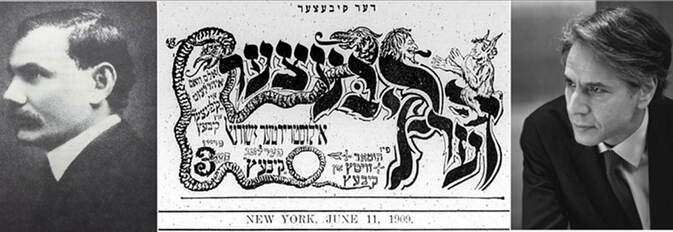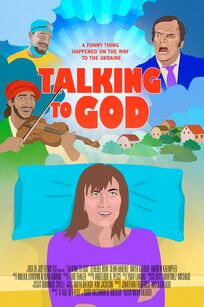 Antony Blinken is on the cusp of being appointed Secretary of State in the new administration of President Joe Biden. One thing many people may not know about Blinken is that his great-grandfather was a Yiddish writer of some repute. Meir Blinken was born in 1879 in Pereyaslav, Ukraine – coincidentally the same shtetl as Yiddish literature’s most famous name, Sholem Aleichem. Blinken gained a Jewish education at a Talmud Torah, before attending the secular Kiev commercial college, part of a joint educational project founded by Ukrainian and Jewish businessmen. He worked as an apprentice cabinet-maker and carpenter, before switching to become a massage therapist. Indeed, he is listed in the Lexicon of Modern Yiddish Literature with the trade of masseur. His son Moritz, Tony Blinken’s grandfather, who became an American lawyer and businessman, was born in Kiev. Blinken Senior emigrated to the US in 1904. His first story, written under the pen-name B Mayer, was published a year earlier, in 1903. Once in America, his sketches and stories appeared in a range of literary, progressive socialist and labour Zionist publications, including the satirical magazine Der Kibetzer (Collection) and Idishe Arbeter Velt (Jewish Workers’ World) in Chicago. In all, he published around 50 works of fiction and non-fiction. Blinken’s books include Weiber (Women), described in the lexicon as a prose poem, Der Sod (The Secret) and Kortnshpil (Card Game). A collection of his short stories published in 1984 and translated by Max Rosenfeld, is still available. His writing dealt with thorny topics including the effects of poverty, poor living conditions, religious strictures, inadequate education and the lack of understanding that immigrants feel about their new country. Most controversially, he was one of the few male Yiddish writers to address the subject of women’s sexuality, writing about marital infidelity and sexual desire and hinting at the sense of boredom felt by housewives. Another subject he tackled remains controversial to this day: showing empathy towards abortion. Writing in a review of Blinken’s work in the 1980s, the journalist and author Richard Elman pointed out that among Yiddish authors writing for the largely female audience of Yiddish fiction, Blinken “was one of the few who chose to show with empathy the woman’s point of view in the act of love or sin”. Elman and others believed that the greatest legacy of the author’s work was that it vividly evoked the atmosphere and characters of the very early Jewish diaspora in New York. According to a 1965 article by the journalist David Shub in the Jewish newspaper The Forward, Blinken was the first Yiddish writer in America to write about sex. In the same article, he wrote that Blinken was also an editor’s nightmare! By the time of his death in 1915 at the age of just 37, Blinken had opened an independent massage office on East Broadway, in the heart of what was at that time the city’s Yiddish arts and letters district. While his writing was very popular among Yiddish-speaking Americans of his own generation, Blinken’s star quickly waned after his death. Photo credit: Ukrainian Jewish Encounter
0 Comments
 I wish I could begin my first article of 2021 with a Happy New Year, but unfortunately everything feels very bleak out there. The UK has headed deeper into lockdown and the US is reeling from an unprecedented attack on its democracy. So perhaps we could all do with a little humour. The articles in my blog often tell terrible tales of suffering and loss, so by way of contrast, here’s something funny and uplifting to help take our minds off all the doom and gloom in these cold, dark days. Talking to God is a 2019 film written and directed by Maya Batash, who also stars in the lead role as Rebecca, an insomniac New Yorker who will try anything to find happiness – and to help her get to sleep. Nothing works until she joins a bunch of equally desperate women on a trip to Uman, the town in Ukraine where the grave of Rabbi Nachman of Breslov (1772-1810) has become a pilgrimage site for religious Jews. The picture was partly filmed on location in Uman. But don’t worry, this isn’t a moralistic tale to convert the viewer to Orthodox Judaism. Surrounded by praying pilgrims at the Rabbi’s tomb, Rebecca remains utterly unmoved. But after a while she realises she’s sleeping better, in spite of the stiflingly hot dorm room she’s sharing with a dozen other women, one of whom crunches crisps (potato chips) noisily in the middle of the night. In search of the answer to the universal question, “What makes us happy?” she discovers The Fixer, a cheery fiddle player who lives in a tiny shack in the forest and looks like he belongs in a Sholem Aleichem adaptation. The Fixer’s narrative is a modern a take on a short story written by Rabbi Nachman himself, A Tale of Faith. In the original, a king goes on a quest to find out if his subjects are truly happy and discovers that the happiest man in his kingdom is completely destitute. “I wanted to connect the two stories,” Batash told the Jewish Press in December 2020. “I tried to modernise Rabbi Nachman’s story and connect it to this modern-day one-woman journey. Since we don’t live in an age with little villages with a king, I turned the character into the king of Hollywood. The basic story premise and message is still there.” The movie mogul is a thoroughly nasty – and unhappy – character, while the Fixer, played by Australian Zebedee Row, is imbued with such an innate joyousness that you just want to bottle it up and take a drop when you need something to cheer you up. “I think people in the world need to laugh more. The world can be a serious place,” Batash says. The moral of the story is that “A person must enlist all his strength to be joyful at all times. It is human nature to be drawn to depression and sadness because of life’s daily events.” And I’m sure that’s good advice to all of us struggling through these dark, depressing times. |
Keeping stories aliveThis blog aims to discuss historical events relating to the Jewish communities of Ukraine, and of Eastern Europe more widely. As a storyteller, I hope to keep alive stories of the past and remember those who told or experienced them. Like so many others, I am deeply troubled by the war in Ukraine and for the foreseeable future, most articles published here will focus on the war, with an emphasis on parallels with other tumultuous periods in Ukraine's tragic history. Archives
March 2024
Categories
All
|
 RSS Feed
RSS Feed
